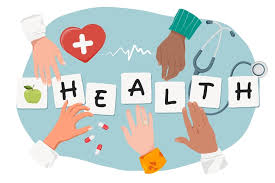50 Health Education Questions and Answers

🧼 Personal and Environmental Hygiene
- Q: What is personal hygiene?
A: It refers to the cleanliness and care of the body to maintain good health. - Q: Mention two examples of personal hygiene.
A: Regular bathing and brushing of teeth. - Q: What is environmental hygiene?
A: It is the practice of keeping our surroundings clean to prevent disease. - Q: Name two effects of poor hygiene.
A: Body odor and skin infections. - Q: List two ways to maintain good environmental hygiene.
A: Proper disposal of waste and regular cleaning of surroundings.
🥗 Nutrition and Diet
- Q: What is nutrition?
A: Nutrition is the process of obtaining and using food for growth and health. - Q: What are the six classes of food?
A: Carbohydrates, proteins, fats and oils, vitamins, minerals, and water. - Q: Which class of food provides energy?
A: Carbohydrates. - Q: What food class helps in body building?
A: Proteins. - Q: Name two sources of vitamins.
A: Fruits and vegetables. - Q: What is a balanced diet?
A: A meal that contains all the six classes of food in the right proportion. - Q: Name two symptoms of malnutrition.
A: Stunted growth and weakness. - Q: What disease is caused by protein deficiency?
A: Kwashiorkor. - Q: What is the function of water in the body?
A: It regulates body temperature and aids digestion. - Q: What is obesity?
A: Excessive accumulation of body fat.
🦠 Diseases and Prevention
- Q: What is a disease?
A: A disease is any abnormal condition affecting the health of an individual. - Q: What is a communicable disease?
A: A disease that can be transmitted from one person to another. - Q: Give two examples of communicable diseases.
A: Tuberculosis and malaria. - Q: What is a non-communicable disease?
A: A disease that is not transmitted from person to person. - Q: Give two examples of non-communicable diseases.
A: Diabetes and hypertension. - Q: What is immunization?
A: The process of making a person immune to a disease through vaccines. - Q: Name one vaccine-preventable disease.
A: Polio. - Q: What organism causes malaria?
A: Plasmodium parasite. - Q: How is malaria transmitted?
A: By the bite of an infected female Anopheles mosquito. - Q: What causes cholera?
A: A bacteria called Vibrio cholerae.
🫀 The Human Body and Health
- Q: What is the function of the heart?
A: It pumps blood throughout the body. - Q: What organ is responsible for breathing?
A: Lungs. - Q: What is the function of the liver?
A: It detoxifies harmful substances and aids digestion. - Q: What is the skeletal system?
A: It is the framework of bones that supports the body. - Q: What organ removes waste from the blood?
A: Kidneys.
🧘 Mental and Social Health
- Q: What is mental health?
A: A state of well-being in which an individual can cope with stress and function effectively. - Q: Mention one sign of poor mental health.
A: Depression. - Q: What is social health?
A: The ability to form satisfying interpersonal relationships. - Q: Give one way to maintain mental health.
A: Talking to a trusted person about problems. - Q: What is stress?
A: A state of mental or emotional strain resulting from adverse situations.
🚭 Drug Use and Abuse
- Q: What is drug abuse?
A: The misuse or overuse of drugs without a doctor’s prescription. - Q: Mention two examples of commonly abused drugs.
A: Tramadol and marijuana. - Q: What is addiction?
A: A condition of being dependent on a substance or activity. - Q: Mention one consequence of drug abuse.
A: Mental disorder. - Q: What is the role of NDLEA in Nigeria?
A: To prevent and control drug trafficking and abuse.
💉 First Aid and Safety
- Q: What is first aid?
A: The immediate care given to an injured person before professional help arrives. - Q: Mention one item in a first aid box.
A: Bandage. - Q: What is CPR?
A: Cardiopulmonary resuscitation – a life-saving technique used in emergencies. - Q: What should you do for a nosebleed?
A: Sit the person upright and pinch the nose for a few minutes. - Q: What is the first thing to do in case of electric shock?
A: Turn off the power source.
🚰 Water, Sanitation, and Public Health
- Q: Why is clean water important?
A: It prevents waterborne diseases like typhoid and cholera. - Q: What is sanitation?
A: The practice of maintaining clean conditions to prevent disease. - Q: Mention one waterborne disease.
A: Typhoid. - Q: What is waste disposal?
A: The proper removal and treatment of refuse and sewage. - Q: Why should we wash our hands regularly?
A: To remove germs and prevent infections.
💔 “She said she loved me. And for fifty-two years, I believed her.” 💔
“Beat the Pressure: A Comprehensive Guide to Lowering Blood Pressure Naturally.”
Buy book from Gumroad or Paystack
Buy The Book "The Longest Lie: A Husband’s Journey Through Love, Betrayal, and Redemption" From Gumroad






